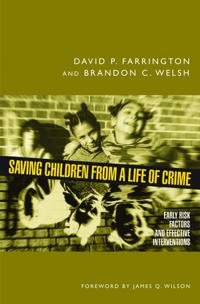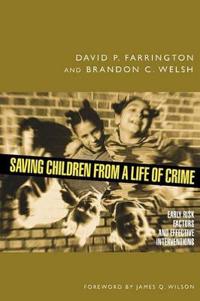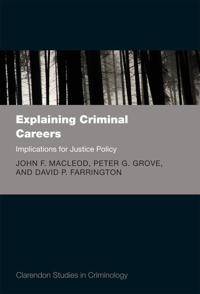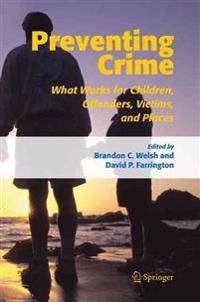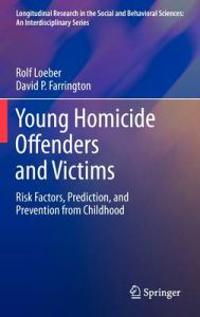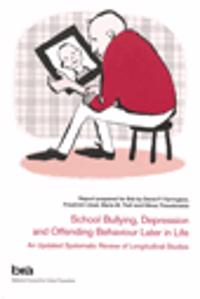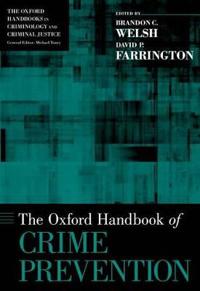Saving Children from a Life of Crime (Inbunden)
avDavid P. Farrington, Brandon C. Welsh
ISBN: 9780195304091 - UTGIVEN: 200612After decades of rigorous study in the United States and across the Western world, a great deal is known about the early risk factors for offending. High impulsiveness, low attainment, criminal parents, parental conflict, and growing up in a deprived, high-crime neighborhood are among the most impor[...]
Saving Children from a Life of Crime (Häftad)
avDavid P. Farrington, Brandon C. Welsh
ISBN: 9780195378993 - UTGIVEN: 200810After decades of rigorous study in the United States and across the Western world, a great deal is known about the early risk factors for offending. High impulsiveness, low attainment, criminal parents, parental conflict, and growing up in a deprived, high-crime neighborhood are among the most impor[...]
Explaining Criminal Careers (Inbunden)
avJohn F. MacLeod, Peter Grove, David P. Farrington
ISBN: 9780199697243 - UTGIVEN: 201208Explaining Criminal Careers presents a simple but influential theory of crime, conviction and reconviction. The assumptions of the theory are derived directly from a detailed analysis of cohort samples extracted from the Home Office Offenders Index - a unique database which contains records of all c[...]
What Works in Preventing Crime?: Systematic Reviews of Experimental and Quasi-Experimental Research (Inbunden)
avDavid P. Farrington, Brandon C. Welsh
ISBN: 9780761925682 - UTGIVEN: 2001-11Crime prevention is necessary in any society. Without it, crime would continue to skyrocket and the society as a whole would suffer. This special volume of The Annals, "What Works in Preventing Crime? Systematic Reviews of Experimental and Quasi-Experimental Research," originated with the 2001 Jerry[...]
Preventing Crime: What Works for Children, Offenders, Victims and Places (Inbunden)
avB. C. Welsh, Brandon C. Welsh, David P. Farrington
ISBN: 9781402042430 - UTGIVEN: 200512Crime prevention should be rational and should be based on the best possible evidence. Decision-makers should weigh heavily any available evidence on what works best. How can a program that has produced no discernable evidence of effectiveness, as shown through numerous evaluations, be considered fo[...]
Young Homicide Offenders and Victims (Inbunden)
avRolf Loeber, David P. Farrington, Robert B. (CON) Cotter
ISBN: 9781441999481 - UTGIVEN: 2011-08The first decade of the new century proved to be a deadly one for many children and young people in the United States. Despite increased policing on the streets, higher rates of incarceration, harsher sentencing, stricter control of illegal drugs, and attempts to reduce access to firearms, FBI repor[...]
The Influence of Mentoring on Reoffending (Häftad)
avDarrick Jolliffe, David P Farrington
ISBN: 9789185664894 - UTGIVEN: 2008-08-30Evidence assessment on the effects of mentoring based on 18 evaluations. Brottsligheten och otryggheten är samhällsproblem som får stor uppmärksamhet och det ställs allt högre krav på samhällets förmåga att hantera dessa problem. Det är viktigt med detaljerad kunskap om vilka grupper i sa[...]
Grannsamverkans effekter på brottsligheten : en systematisk forskningsgenomgång (Häftad)
avTrevor H Bennett, Katy R Holloway, David P Farrington
ISBN: 9789186027032 - UTGIVEN: 2008-06-23Grannsamverkan mot brott - hur väl fungerar metoden? Brå har anlitat internationella forskare för att göra en systematisk genomgång av den befintliga forskningen om förebyggande effekter av grannsamverkan. Genom att söka upp och lägga samman de bästa utvärderingarna på området, kan fors[...]
School bullying, depression and offending behavior later in life : an uppdated systematic review of longitudinal studies (Häftad)
avDavid P. Farrington, Friedrich Lösel, Maria M. Ttofi, Nikos Theodorakis
ISBN: 9789186027896 - UTGIVEN: 201207Konsekvenser av mobbning i skolan: Vad lär oss forskningen?
En systematisk översikt över totalt 78 longitudinella studier som tar upp mobbningens konsekvenser senare i livet för både dem som mobbar och för dem som blir utsatta för mobbning i under skoltiden.[...]The Oxford Handbook of Crime Prevention (Inbunden)
avBrandon C. (EDT) Welsh, David P. (EDT) Farrington, Brandon C. (EDT) Welsh
ISBN: 9780195398823 - UTGIVEN: 2012-03How can a society prevent-not deter, not punish-but prevent crime? Criminal justice prevention, commonly called crime control, aims to prevent crime after an initial offence has been commited through anything from an arrest to a death penalty sentence. These traditional means have been frequently e[...]
Mentorskaps inverkan på återfall i brott : en systematisk forskningsgenomgång (Häftad)
avJollife, Darrick, Farrington, David P
ISBN: 9789185664931 - UTGIVEN: 2008-08-30En systematisk genomgång av den befintliga forskningen om förebyggande effekter av mentorskap som metod för att förebygga brott och annat destruktivt beteende hos unga.
Mentorskap som metod för att förebygga brott och annat destruktivt beteende tilldrar sig allt större intresse. Metoden in[...]

